- Home
- Rose Tremain
The American Lover Page 3
The American Lover Read online
Page 3
‘Tell me . . .’ says Rosalita.
It’s a winter afternoon, but the lights are still on. Rosalita is coiling up the Hoover cable.
‘Well, I’d hung on to that car. It seemed like the only thing that anyone had given to me and not taken away again. But I hadn’t taken care of it. It was a heap of rust. People were right not to give me things, I guess. My brain wasn’t big enough to take care of them.
‘I wasn’t trying to kill myself, or anything. I was driving to see my friend, Edwina, the one with the lovely skin, who’d helped me through the abortion.
‘I was on some B-road in Suffolk. I braked on a bend and the brakes locked and that’s all I can remember. The car went halfway up a tree. That long snout the E-Type has, that was concertina’d and the concertina of metal smashed up my legs.’
‘Right,’ says Rosalita, putting the Hoover away. ‘Now you are going to do some walking, then we will have rum and hot chocolate.’
The Three Day Week has ended with the miners’ defeat. Britain tries to get ‘back to normal’.
‘There is no normal,’ says Beth to Rosalita. ‘The only “normal” has been talking to you in the afternoons.’
But that is ending, just as everything else seems, always, to end. Rosalita is leaving London to return to Setúbal, to nurse her dying mother.
‘She doesn’t deserve me,’ Rosalita comments. ‘She only loved Antonio, never me. But in my blood I feel I owe her this.’
‘Don’t go,’ pleads Beth.
‘Alas,’ says Rosalita, ‘it has to be like this. Some things just have to be.’
On Rosalita’s last day both she and Beth feel unbearably sad. As Rosalita walks out of the flat for the last time, she says: ‘All the secrets you told me I shall keep inside me, very safe.’
‘And your brother, Antonio, the matador,’ says Beth. ‘I will keep his memory safe. I will think about the light on his face.’
Beth waits for the clunk of the elevator’s arrival. Then she hears Rosalita get into the elevator and close the door and she remains very still, listening to the long sigh of the lift going down.
A year after Rosalita leaves, Beth is able to walk once more, with the aid of a stick.
One day she takes the bus to Harrods, suddenly interested to visit the place where she’d worked long ago, cutting wrapping paper with mathematical care, fashioning bows and rosettes out of ribbon, making the most insignificant of gifts look expensive and substantial. It had seemed to her a futile thing to be doing, but now it doesn’t strike her as futile. She can see that a person’s sanity might sometimes reside in the appreciation of small but aesthetically pleasing things.
Holding fast to her stick, she gets on to the familiar escalators. The feeling of being moved around so effortlessly, whether up or down, has always given her pleasure. As a child, she used to beg to be brought here, to the escalators. She loved to watch the people moving in the opposite direction, like dolls on a factory conveyor belt.
She’s watching them now, these human dolls: a multitude of faces, ascending to Soft Furnishings, descending to Perfumerie and Banking, all locked away in their own stories.
Then she see Thaddeus.
He’s descending. She’s going up. She stares at him as he passes, then cranes her head round to keep watching him as he goes on down. And she sees that he, too, has turned. Changed as she is, he has recognised her. His face is locked on hers.
She gets off the escalator at the first floor (Lingerie, Ladies’ Shoes, Children’s Clothes). Her heart cries out for her to run to the descending escalator, to follow Thaddeus, to rush into his arms. But her body is too slow. Her legs won’t let her run. She stands on the first-floor landing, looking down.
She sees Thaddeus stop and look up. Then he joins the people surging towards the exit doors and follows them out.
Captive
Owen Gibb grew up on a hundred-acre farm in south Norfolk, with apple orchards and a pond for geese and ducks, and fields of lush grazing for a fine herd of Herefords. Wooden chicken houses, set out across a muddy rise, were shaded by ancient oaks. In the cool dairy, butter was churned.
When Owen’s parents died, he had to sell the farm. What remained to him, when all the tax and all the debts had been paid, was a small bungalow, once occupied by his grandmother, and a piece of land, half an acre long, leading down to a quiet road. The new owners of the farm rooted out the apple trees and turned the dairy into a holiday cottage.
Owen knew that it was important, with a legacy as meagre as this, to make an immediate plan for it. Delay would get him nowhere. He was fifty and alone. His only companions were his black Labrador dogs, Murphy and Tyrant, and it was they who inspired his plan.
He designed a set of boarding kennels. He’d heard you could make a good living out of people’s longing to be rid of their pets, in order to holiday in Spain or Florida – or just to be rid of them, full stop. For that was part of human nature: a longing to be rid of the things you’d thought you might be able to love, and found you couldn’t.
All Owen had to do was build the kennels with care, make them solid and comfortable, so that he could designate them ‘superior’. Long before the building work was complete, he’d chosen the wording for his sign: ‘Gibb’s Superior Dog-Homing Facility’.
He set the kennels in two rows, running down towards the road, with a green exercise space to the west of them. In each pen, he installed a shelter, made of wood planking and bedded with straw, which reminded him of the old henhouses. The open areas in front, where the dogs could walk round and round – as prisoners do in a yard – were fenced with sturdy chain-link. The flooring was concrete (the only practical solution) but underneath the concrete, Owen laid in a network of heating pipes that would run off the bungalow’s oil-fired boiler. ‘Your pet,’ Owen heard himself announce to his future clients, ‘will never suffer from cold in this facility.’
He decided, too, that his kennels would be available to all-comers.
After failing to halt his plans at the local council office, the owners of the farm had tried to get him to promise that he wouldn’t take in dangerous dogs, but he’d refused. He knew that housing Staffordshire bull terriers, Dobermanns or Rottweilers would put up his Public Liability Insurance premiums. But Owen Gibb was a man who felt some affection for all animals. It didn’t trouble him that some of them possessed a harsh kind of nature. He thought he could have grown accustomed to wolves, or even jackals – provided that there wasn’t a whole pack of them: too many to love.
* * *
Word circulated quickly around the local area: ‘Gibb’s Superior’ was the best and most economical place to board your dog. The food and shelter were good, with the heated floors providing reassurance in winter. The animals got proper exercise every day – in rotation according to their breed, size and sex. And, most important of all, if you stayed away longer than you’d agreed, Owen would always ‘sort something out’.
Soon, Owen’s booking ledger was so crammed that he began to consider nibbling some land from the exercise space, in order to extend the kennels beyond the thirty places provided at present. It troubled him to turn an animal away, as though this act of his would condemn it to unacceptable suffering, or even death. Because people were hard-hearted: this he knew. If a pet stood between them and their restless desires, they weren’t ashamed to have it put down, or turn it out into some wasteland, far from home, to ‘fend for itself’ – whatever they thought that might mean.
Owen drew up plans for ten more units. He hired a plumber to find a way of running a spur off the underfloor heating grid and ordered a second oil tank.
Work was almost ready to begin when, on the first day of a new year – the kennels full to capacity with assorted boarders – a front of arctic weather drove south from Scandinavia and settled over East Anglia.
Snow fell and rested on the frozen earth and piled up on the wooden roofs of the shelters. Owen stood at his front window, watching.
The dog
s came out of the shelters and smelled the frosty air and raised their heads into the whirl of snowflakes, trying to bite them as they fell. Though the blizzard was obliterating the path to the road, Owen was exhilarated to see that where it fell onto the concrete pens, it quickly melted. The heating pipes were doing their job.
Owen knew the dogs would still be cold in these conditions – especially the two Staffordshire bull terriers he’d boarded since Christmas, whose smooth skin appeared almost as vulnerable to Owen as the skin of a man’s body – but they’d survive. He’d increase their food ration, shred newspapers to add to the straw, put coats on the Staffies and on the overweight little Dachshund bitch called Cherry.
It snowed all day, pausing at night to uncover stars and a deep frost, and began snowing again the following morning. It felt, to Owen, as he worked on the paper-shredding, as though the fat snow would never stop, but keep falling and falling into the heart of the year’s beginning, blocking any artery that led to spring. But he and the dogs would endure it together, as the Herefords had endured it through his childhood, as the old apple trees had endured it, motionless in the wind, under their white burden.
Two days later, Owen was woken at seven, in darkness, by the sound of the dogs howling.
His bedroom was icy. He drew back the curtains and saw snow piled a foot high on the outer sill. He fumbled for the warmth of the radiator under the window, but it was cold.
Owen tugged on a fisherman’s sweater, cords and worn slippers and padded to the kitchen, where he knew what he would find: the boiler was out.
The boiler was old, difficult to light. Owen kneeled down and took the housing off the ignition box, smelling oil, surprised at how quickly the appliance, which had been burning strongly at midnight, had cooled.
His hands were shaking. The sound of the dogs’ howling choked him. Murphy and Tyrant, their tails optimistically wagging, crowded round Owen’s crouching figure, and he didn’t push them away, but kept them near to him for comfort.
He tried to think clearly. He spoke aloud to the Labradors: ‘Useless to try to relight the boiler if snow’s piled up on the chimney stack, eh, lads?’ he said. Murphy licked Owen’s face. Tyrant’s tail beat against the boiler-housing. ‘Boiler’ll cut out straight off if there’s anything blocking the outflow. So, what’s to do next, Murph? Tyrant? Get a ladder, I guess, and clear the stack. Right? Then come back in and try the old relighting procedure. Pray it works.’
Owen tugged on heavy socks and boots and his warmest farm coat and opened the back door and Murphy and Tyrant went out to do their business, jumping through the snow to reach a favourite spot.
But Owen stood motionless on the threshold of the door. Hoisting a ladder, clearing snow from the stack: these tasks didn’t trouble him. What he dreaded was the sight that awaited him at the kennels. He sniffed the outside air and could guess at a temperature of minus 5 or 6 degrees. Animals without fur succumbed quickly to hypothermia in cold of this intensity. They were howling now, but unless he got the boiler going, they would soon enough fall silent.
He’s out in it now. He keeps looking back at his footprints in the snow, leading away from the oil tank, finding it hard to believe what he’s just seen.
He carries a bucket of high-protein food. He stands by the pens. Some of the dogs come out from the shelters and try to push through the deep snow towards him. He throws bits of food through the wire. There is no sign of the Staffies.
He longs for someone to help him. He thinks wistfully of the days when his parents were alive, companionable voices to console and advise. Because he’s trapped. In the night – the coldest night of this winter – somebody came and committed a crime against him. He keeps vainly hoping that he’s imagined it, but he knows he hasn’t. Silently in the snow, these criminal people unlocked his oil tank and siphoned out every last drop of oil. Every drop.
He believes these criminals are his neighbours, the family who walk the loved land where he grew up, but who detest him and his dogs and want to bring all his endeavours to nothing. He can’t be sure it was them, of course, and he believes that he will probably never get to the bottom of a thing so steeped in hate, but suspicion will linger. The very people who own what should have been his are intent upon his ruin.
He must defy them.
He’s called all the oil-delivery merchants he can find in the phone book. Most – because it’s the week of the New Year – aren’t answering; those that answer say demand for heating oil is so heavy they won’t be able to get to him for another nine or ten days.
Owen walks on slowly down the line of kennels. One of the pit-bulls lies dead with his jaw clamped round the chain-link gate, as though trying to bite his way out. The Dachshund, Cherry, is a lifeless, snow-covered mound. Owen shivers as he stares at the fat little corpse. From the bungalow comes the sound of his landline ringing: dog-owners calling from ice-bound stations or airports, asking him to keep the dogs until the thaw comes.
There will be no thaw. This is how it feels to Owen. He and the animals are imprisoned for all time in a frozen world.
He tries to master his shivering and to think clearly. He knows that he has no choice. He will have to bring the dogs inside the bungalow. Twenty-eight dogs.
He’ll try to separate them, as he does for their exercise routine, so that they don’t constantly mate and fight with each other. But still, their animal natures, confined, confused, will create turmoil around him. Their barking and howling and rampaging will fill his every waking hour and make sleep impossible. Murphy and Tyrant will cower in corners, hide in cupboards, their familiar territory usurped by strangers. And everything that Owen possesses will be torn and stained and brought to desolation.
But there’s no other way to save the dogs. No other way. He feels paralysed, as though he’s suddenly become ill or old.
He turns away from the kennels and walks towards the house. The howling and whimpering of the dogs resume as they watch him leave.
But he needs a moment of respite. He remembers that he still has electricity. He’s going to make himself a cup of tea, something to warm him, at least, before he faces all that he has to face in the coming day.
He fills the electric kettle. He stands waiting for the homely sound of its boiling to mask the noises outside, which now come to him as though from a faraway country, a barbaric place, where there is no order or kindness, the sort of place he’d hoped never to inhabit.
The Jester of Astapovo
A few weeks before the main events of this story disturbed forever the life of its protagonist, Ivan Andreyevich Ozolin, he had believed himself to be in love with an older woman, Tanya Trepova.
The year was 1910. Ivan Andreyevich Ozolin was the stationmaster of Astapovo, an insignificant little stop some 120 miles south-east of Moscow, on the Smolensk–Dankovo section of the Ural railroad line. He was forty-six and had been married to his wife, Anna Borisovna Ozolina, for twenty years. Tanya Trepova was a widow of fifty-three with excellent deportment, but whose pale face wore an expression of perpetual and affecting melancholy. It had been this melancholy of hers that Ivan Ozolin had longed to alleviate. On one of his days off (which were few) he arranged to go on a bicycling trip to the forest with Tanya Trepova, pretending to Anna Borisovna that he was going mushroom-picking.
Ivan Ozolin and Tanya Trepova sat down on the mossy earth, where there were indeed a few pale mushrooms nestling among the tree roots. Ivan wanted to lean over and kiss Tanya, but he felt that to touch with his lips features still set in such a sorrowful arrangement was tantamount to an insult. So what he decided to do was to lean back on his elbows and cross one leg over the other and point out to his would-be mistress the ridiculous appearance of his white cycling socks.
‘Look at these!’ he said with a guffaw. ‘And look at the little bit of my leg showing between the top of the sock and the bottom of my trousers. How can we take anything seriously – anything in the world – when we catch sight of things like this? Life’s a
joke, don’t you think so, Tanya? Every single thing in life is a joke – except love.’
A smile did now appear on Tanya Trepova’s face. It remained there long enough for Ivan to get up the courage to say: ‘I’d like to make you happy. I’m serious about that. My wife thinks I’m a fool who jokes about everything, but to jest is better than to despair, don’t you think?’
The September sun, coming and going between clouds, flickering through the trees, now suddenly laid on Tanya Trepova’s pale skin a steady and warming light. But as soon as this light arrived there, her smile vanished and she said: ‘Sometimes despair is unavoidable.’
Then she got to her feet and brushed down her skirt and said: ‘I shouldn’t have come to the forest with you, Ivan Andreyevich. I can’t think what I was doing. I only agreed because I was flattered by the kind attention you’ve shown me since my husband died, and because I enjoy cycling. But please let’s go back now.’
Ivan was a courteous man. Despite his strong feelings for Tanya Trepova, he wasn’t the type to take advantage of any woman – even here, in the eternal silence of the woods. So he got up obediently, tugging down his trouser leg over his rucked white sock, and he and Tanya Trepova walked to where their bicycles were parked, then rode back to Astapovo, side by side, talking only of inconsequential things.
When Ivan Ozolin got home to his red-painted stationmaster’s cottage, Anna Borisovna asked: ‘Where are the mushrooms, then?’
‘Oh,’ said Ivan, swearing silently at his forgetfulness. ‘I couldn’t find any. I searched and searched. I didn’t find a single one.’

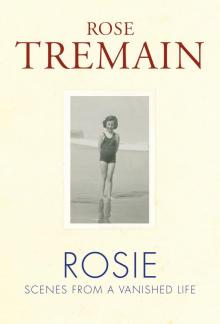 Rosie
Rosie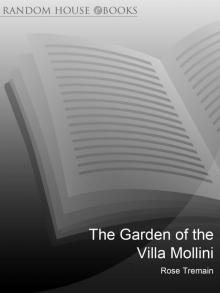 The Garden of the Villa Mollini
The Garden of the Villa Mollini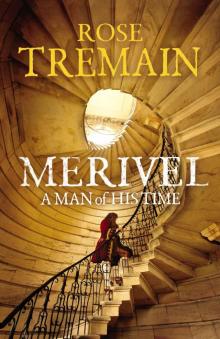 Merivel: A Man of His Time
Merivel: A Man of His Time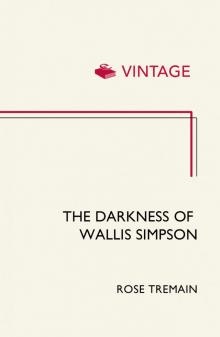 The Darkness of Wallis Simpson
The Darkness of Wallis Simpson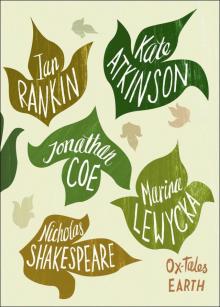 Earth
Earth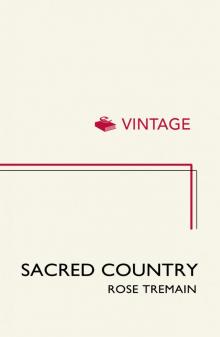 Sacred Country
Sacred Country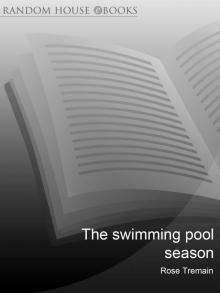 The Swimming Pool Season
The Swimming Pool Season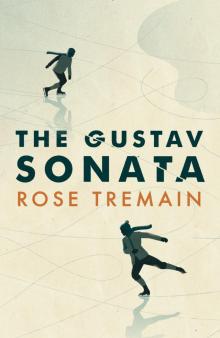 The Gustav Sonata
The Gustav Sonata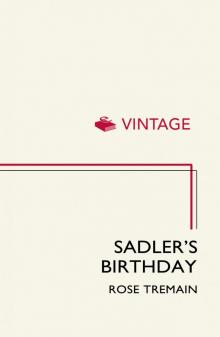 Sadler's Birthday
Sadler's Birthday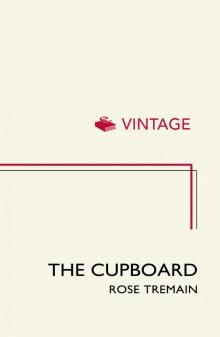 The Cupboard
The Cupboard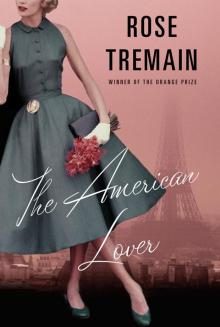 The American Lover
The American Lover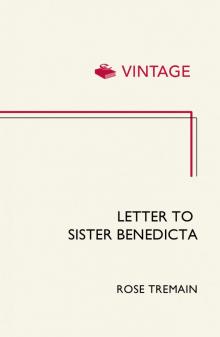 Letter to Sister Benedicta
Letter to Sister Benedicta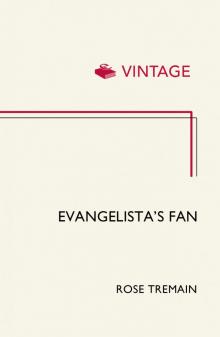 Evangelista's Fan
Evangelista's Fan Restoration
Restoration The Road Home
The Road Home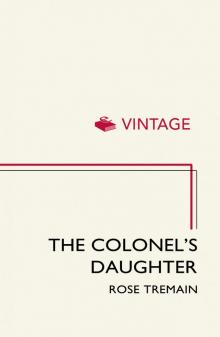 The Colonel's Daughter
The Colonel's Daughter The Way I Found Her
The Way I Found Her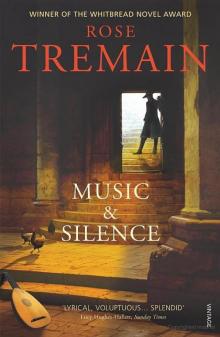 Music & Silence
Music & Silence